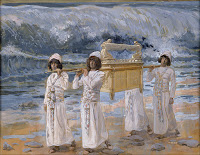 |
| Leprous King Uzziah |
Hence his fame spread afar, for he was marvelously helped until he was strong. But when he became strong, his heart was so proud that he acted corruptly, and he was unfaithful to the Lord his God, for he entered the temple of the Lord to burn incense on the altar of incense.(2 Chronicles 26:15b-16a NASB)
Uzziah was a righteous King. It is said in v. 4, “He did right in the sight of the Lord, yet when he became strong he turned out to be weak. His life reveals to us the weakness of strength.
In many places in the Bible, we are told to be strong in the Lord. Unfortunately, Uzziah’s strength had come to be in himself and not God. What precipitated this change? We are explicitly told that when he became strong, his heart was proud. Pride is the fatal flaw of all human nature. Disobedience is always the sign that self-will is starting to take control of your life. Uzziah entered the temple of the Lord to burn incense, a task reserved for the priest. Becoming strong through our own success can have an intoxicating effect on us. We can start to dwell on what we have done and not what God has done for us. At some point, the balance of power shifts and we begin to think that we know better than God, and we act accordingly. Today, pastors of great churches are doing things expressly forbidden by the Bible. Pride deceives the great and the small.
Pride can never be rehabilitated, it has to be eradicated. When the signs of arrogance arise, we must be brutally honest with God and man. Pride conceals what humility reveals, the weakness of strength.
Image used with permission by Microsoft.
Ken Barnes the author of “The Chicken Farm and Other Sacred Places” YWAM Publishing
Email: kenbarnes737@gmail.com
website: https://sites.google.com/site/kenbarnesbooksite/
Email: kenbarnes737@gmail.com
website: https://sites.google.com/site/kenbarnesbooksite/



